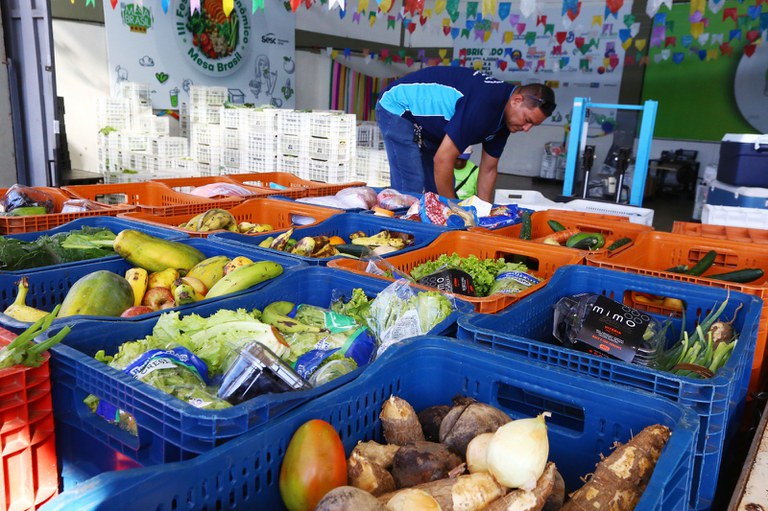Hunger and food insecurity drive changes in global governance, specialists say
The context of economic and climate crisis imposes challenges to strategies to combat world hunger. Specialists say that the democratization of global governance and the strengthening of multilateralism are urgent
In 2022, approximately 735 million people in the world lived in hunger and 2.3 billion were in a context of food insecurity. The reduction of the pace of economic recovery in the COVID-19 post-pandemic period as well as the war between Russia and Ukraine jeopardized food production and distribution. Besides that, the low income of the poorest prevented the reduction of hunger and poverty in the global scale, reveals the report on the State of Food Security and Nutrition in the World, published by the United Nations (June/2023).

In the evaluation of Nosipho Nausca-Jean Jezile, president of the Committee on Food Security (CFS) of the United Nations, the intergovernmental forum that oversees policies on the production and physical and economic access to food, these areas had a decisive impact over the global agrifood systems. They raised the challenges and pushed forward actions of governance around the issue, “while conflicts, climate change, wars, and fluctuations in global economic tendencies disturbed the supply chains”, Noshipo pointed out.
“The recent crisis presented a lesson to rethink food systems and policies through the standpoint of political leadership at the international level. A multilateral approach is required to connect particular interests. Wars and conflicts pose one of the main challenges for the food agenda. Today, there are 2.2 million Palestinians facing hunger. It is a great challenge for the international system”, highlighted Michael Fakhri, special rapporteur on the Right to Food of the United Nations High Commission for Human Rights - OHCHR.
"Wars and conflicts pose one of the main challenges for the food agenda. Today, there are 2.2 million Palestinians facing hunger. It is a great challenge for the international system", Michael Fakhri

Combating hunger and global governance reform
Putting the combat of hunger and inequalities at the center of the global agenda is one of the priorities of the Brazilian presidency of the G20. As part of the work done by the Sherpa Track, the Brazilian presidency of the G20 launched the Task Force for a Global Alliance against Hunger and Poverty. This task force will include efforts to raise resources and knowledge so that the nations of the Group, as well as other countries interested in adhering to the initiative, may commit to implementing public policies and social technologies that will be effective for the reduction of hunger and inequalities across the world.

Connected to this agenda, the Brazilian proposal indicated the urgency for a new model for the functioning of international institutions, created in the context of post-World War II to deal with economic, political, or cultural issues that affect more than one State. Organizations such as the United Nations, the World Trade Organization (WTO), the World Bank, and the International Monetary Fund (IMF), for example.
Sofia Monsalve, secretary-general of FIAN International (an organization that advocates for the Human Right to Adequate Food and Nutrition), assessed Brazil’s actions before international institutions on the topic of food as strategic. Monsalve considers G20 to be the space for dialog about global rules required to strengthen democratic multilateralism. “The global governance structure is not democratic, because it is led by the stronger countries. There is a need for international public regulation and for tributary milestones to elevate taxes for [1] corporations", analyzed Monsalve.
“The global governance structure is not democratic, because it is led by the stronger countries. There is a need for international public regulation and for tributary milestones to elevate taxes for corporations", Sofia Monsalve
For Elisabetta Recine, president of the Brazilian National Council on Food and Nutritional Security (Consea), a forum that assists the Brazilian government in the implementation of public policies to combat hunger, strengthening multilateralism requires that the States reinstate the legitimacy of the spaces where these discussions take place and safeguard the independence of these forums.
“The countries need to take on the responsibility for bringing back the conditions that will allow these structures, which today are no longer capable of responding to the geopolitical dynamics and the complexity of the agendas and need to be reformed, to function with sustainability. They must democratize these spaces so that they have the sovereignty to discuss issues, whatever they may be, as equals. The question of the hierarchy of power among these countries undermines the legitimacy of these spaces”, alerted Recine.
Global governance and adequate food
The democratization of the global governance system to promote the human right to adequate food was the topic of an international seminar promoted by Consea[1] as a pre-event of the Committee’s 6th Conference, held in December in Brasília.
